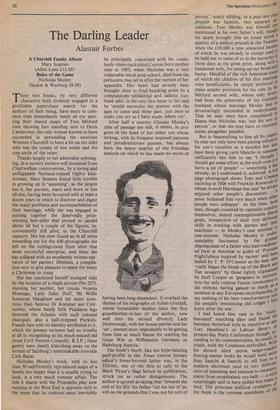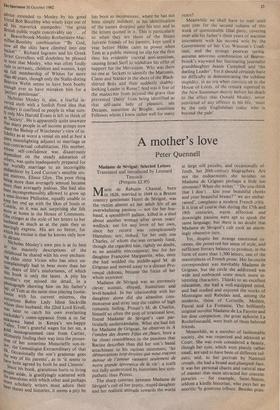The Darling Leader
Alastair Forbes
These two books, by very different characters both tirelessly engaged in a profitable paperchase search for the authors of their being, have more in com- mon than immediately meets an eye spot- ting their shared snaps of Tom Mitford (one showing him standing next to Doris Castlerosse, the only woman known to have succeeded in persuading the uxorious Winston Churchill to have a bit on the side) who was the cousin of one writer and the step-uncle of the other.
Thanks largely to her admirable upbring- ing, in a nursery enclave well insulated from Chartwellian controversies, by a loving and unflappable Norland-trained Ogilvy kins- woman, Mary Soames found little trouble in growing up in 'assuming', as the jargon has it, her parents, warts and more or less all else, having been favoured with at least a dozen years in which to discover and digest the many problems and incompatibilities of their marriage, while she was engaged in putting together the deservedly prize- winning best-seller that proved so candid about all but a couple of the figures, in- conveniently still alive, in the Churchill tapestry. She has now found an in all sense rewarding use for the 430 photographs she left on the cutting-room floor after that most successful enterprise, and these she has collated with an excellently written nar- rative of her parents' lifetimes, a compila- tion sure to give pleasure to many for many a Christmas to come.
She has confessed herself stumped only by the location of a single picture (No 227), showing her mother, her cousin Venetia Montagu, Lady Juliet Duff, Mr Willie Somerset Maugham and the more noto- rious than famous Dr Kommer aus Czer- nowitz, whose bandy little Pandarus legs bestrode the Atlantic with such colossal chutzpah; also a half-cropped Puckish- Panish face with no identity attributed to it, which the present reviewer had no trouble at all in recognising as his much-missed old chum Cyril Vernon Connolly, R.I.P.; these gentry were clearly klatsching away on the terrace of Salzburg's unmistakable riverside Cafe Bazar.
Nicholas Mosley's book, with its less than 50 indifferently reproduced snaps of a family less happy than it is usually trying to look, is a very much rummer affair. The title it shares with the Pirandello play now running in the West End is apposite only in the sense that its contents .must inevitably be principally concerned with his count- lessly-times-cuckolded Curzon-born mother who in 1933, when Nicholas was a very vulnerable ten at prep-school, died from the peritonitis that set in after the rupture of her appendix. Her heart had already been brought close to final breaking point by a compulsively unfaithful and sadistic hus- band who, in his very first letter to her said he 'would surrender the present with the ages to come and those past, just once to make you cry as I have made others cry'.
After half a century Cimmie Mosley's rites of passage are still, it seems, in pro- gress in the head of her eldest son whose writing, with its frequent imposed patterns and peradventurous guesses, has always born the heavy imprint of the Freudian analysis on which he has made no secret of having been long dependent. It overlaid the themes of his biography of Julian Grenfell, whose formidable mother (also the first grandmother-in-law of the author, now well into his second divorce) Lady Desborough, with her house-parties and her 'set', seemed most improbably to be getting from him as much blame for starting the Great War as Wilhelmine Germany or Habsburg Austria.
The book's blurb, like the hype-faluting puff-profile in the Times (whose literary editor's lower-browed father was, in the Thirties, one of the first to rally to the Black Pirate's flag) before its publication, struck me as rather disingenuous. The author is quoted as saying that 'towards the end of his life' his father 'cut me out of his will on the grounds that I was not his sort of
person', neatly elliding, in a post hoc ergo propter hoc fashion, two separate oc" curences. Tom Mosley was himself not mentioned in his own father's will, though his death brought him an estate worth a quarter of a million pounds in the Twenties when the £10,000 a year unearned income of which he was already in receipt used to be held out to some of us in the nurseries of those days as the great prize, along with a handsome wife, for eating up our bread and butter. Mindful of the rich American trusts of which the children of his first marriage were beneficiaries, he simply preferred 1° make ampler provision for his sons by his Mitford second wife, whose only down' had been the generosity of the Guinness husband whose marriage Mosley had 5° devastatingly succeeded in undermining' That he may once have complained to Diana that Nicholas was 'not his sort of person', or that she may have so reported. seems altogether possible. But in bequeathing to him all his papers he may not only have been paying tribute to his son's vocation as a novelist but al° have been giving carte blanche to someorle, sufficiently like him to say 'I thought •' should get some effort at the truth even if lt hurts a lot of people' — something it h,.3,51 already, as I understand it, achieved. A In" page photograph shows Tom and Cinuol! yachting in 1926 with Franklin Roosevelt or whom Averell Harriman has said 'he alwaYst enjoyed other people's discomfort . • • never bothered him very much when otlie,.1. people were unhappy'. At the time, b°", men, though cossetted by capitalist condor; themselves, shared unexceptionable libel, goals, irrespective of their very different skills in working with parties and their machines — in Mosley's case minimal to non-existent. Nicholas Mosley is standably fascinated by the gradual degringolade of a father who had condemn ed Dyer at Amritsar as guilty of 'Prussian frightfulness inspired by racism' and 101 hailed by T. P. O'Connor as the man vill()ci 'really began the break-up of the Black and Tan savagery' by those rightly stigmatised by Duff Cooper as 'gangsters in uniforril,, into the only copycat Fascist condottieretva die without having gained so much . as mention in any European encyclopaedia, to say nothing of his later transformation in the amiably reminiscing old codger 1 first knew after the war. I had heard him rant in his 'sooty' bosomed' marching days and found his baroque rhetorical style as repulsive as ant Tory Heseltine's or Labour Benn's at present-day Party Conferences though, ac cording to his contemporaries, he could,,Itill youth, hold the Commons enthralled. Wit r his absurd silent movie tango-teache fencing-master looks he would need Mare than Saatchi & Saatchi to sell him t° a modern electorate used to very different sorts of hamming and immune to mesme.rl,, stares from exopthalmic eye-balls a toe; surprisingly said to have pulled him many bird. The principal political revelation the book is the extreme soundness of 01' advice extended to Mosley by his good friend Bob Boothby who wisely kept out of all his maverick stampedes: 'the great British public might conceivably say ... of a Beaverbrook-Mosley-Rothermere-Mac- millan-Boothby combination "By God, now all the shits have climbed into one basket" '. Richard Ingrams and his Greek Street Grovellers will doubtless be pleased to note that Mosley, who was often foully nide to servants, children and women, kept uP full membership of Whites for more than 60 years, though only the Stalin-doting Beatrice Webb seems to have been booby enough ever to have mistaken him for a Perfect gentleman'. Nicholas Mosley is, alas, a fearful in- verted snob with a foolish fixed idea that adultery is confined to people in what sure- ly Only Mrs Harold Evans is left to think of as 'Society'. He is apparently quite unaware that many people in all income groups now share the Bishop of Winchester's view of in- fidelity as at worst a venial sin and at best a tnere moonlighting adjunct to marriage or non-contractual cohabitation. His mother, dependent self-confidence was disastrously ‘LePendent on the steady adoration of others, was quite inadequately prepared for her worldly marriage to an incorrigible Philanderer by Lord Curzon's sensible sex- pot mistress, Elinor Glyn. The poor thing being more than averagely sensual became
been than averagely jealous. She had also ueen incomprehensibly allowed to grow up
a, semi-literate Philistine, equally unable to Coterie, her end up with the likes of Souls or ,`"oterie, so it was not surprising she felt
more at home in the House of Commons.
husband cringes at the style of her letters to her ansband as much as at the pain they so movingly express. His are no better, for
which his excuse is that he knows only how to dictate, Nicholas Mosley's own pen is at its best in his masterly descriptions of the Fhildhood he shared with his ever enchant- ing elder sister Vivien who has since un- !ontPlainingly had to bear more than her lair share of life's misfortunes, of which this book is only the latest. A pity his novelist's eye missed the detail, in a rh°tograph showing him on his father's ,413, of Tom at the same time playing footie- lootie with his current mistress, the notorious Bolter Lady Idina Sackville !hose then husband, the 22nd Lord Erroll, was later to catch his own everlasting
enckolder's come-uppance from a so far
unknown PP
in Kenya's sex-happy valley, Tom's grateful wages for her sin, a 8old monogrammed case from Cartier, sUltimately finding their way into the posses-
°n ofof her sometime Moncrieffe son-in- the Genealogist-Extraordinary of that t'k, Occasionally the son's grammar goes he waY of his parents', as in 'it seems to aye been agreed by both he and Cimmie'. Since his book, gratuitous hurts to living people aside, is gratifyingly scattered with e anecdotes with which other and perhaps more scholarly writers must adorn their later theses and histories, it seems a pity he has been so inconsistent, where he has not been simply indolent, in his identification of the names dropped into his text and in the letters quoted in it. This is particularly so when they are those of the Haute Juiverie friends of his parents, kept until a year before Hitler came to power when Tom at a public meeting let slip for the first time his evidently visceral anti-semitism, causing Israel Sieff to withdraw his offer of support for the Movement. Why was there no one at Seekers to identify the Marconis, Ciano and Starace in the shots of the Black- shirted Brits and their suddenly shabby- looking Leader in Rome? And was it fear of the malocchio from beyond the grave that prevented 'Daisy' from being identified as that self-same lady of pleasure, née Decazes, sometime de Broglie, sometime Fellowes whom I knew rather well for many Meanwhile we shall have to wait until next year for the second volume of this work of questionable filial piety, covering inter alia his father's three years of wartime internment with his second wife by the Government of her Coz Winston's Coali- tion, and the strange postwar spring- autumn amorous combination of Beaver- brook's wayward but fascinating journalist granddaughter Jeanie Campbell and 'the darling Leader'. Yet it should certainly have no difficulty in demonstrating the sublime stupidity, in an era when convicts sit in the House of Lords, of the remark reported in the New Statesman shortly before his death E0 the effect alai Oswald Mosley, never convicted of any offence in his life. 'must be the only Englishman today who is beyond the pale'.











































 Previous page
Previous page